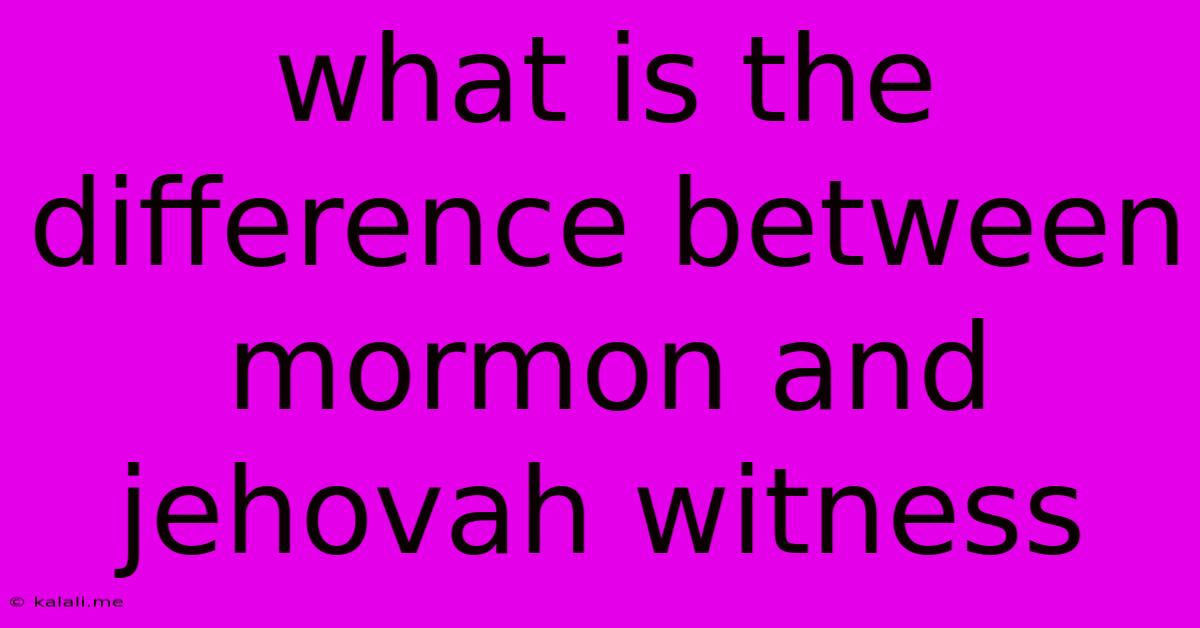What Is The Difference Between Mormon And Jehovah Witness
Kalali
Jun 02, 2025 · 3 min read

Table of Contents
Mormon vs. Jehovah's Witness: Key Differences in Beliefs and Practices
Understanding the differences between Mormons (members of The Church of Jesus Christ of Latter-day Saints) and Jehovah's Witnesses can be challenging, as both groups are often misunderstood. While both are Christian denominations, their beliefs and practices diverge significantly on several core theological issues. This article will illuminate the key distinctions between these two faith traditions.
Key Differences at a Glance:
- Scripture: Mormons accept the Bible, but also the Book of Mormon, Doctrine and Covenants, and Pearl of Great Price as scripture. Jehovah's Witnesses primarily use the New World Translation of the Holy Scriptures.
- Jesus's Nature: Mormons believe in Jesus Christ as the literal Son of God, the Firstborn of the Father, and a God himself. Jehovah's Witnesses believe Jesus is the first creation of God, a mighty spirit being, not God himself.
- Godhead: Mormons believe in a God who is a family, with a Heavenly Father, Jesus Christ, and the Holy Ghost as distinct beings. Jehovah's Witnesses believe in one God, Jehovah, and view Jesus as his Son.
- Salvation: Mormons believe in salvation through faith, repentance, baptism, receiving the Holy Ghost, and enduring to the end. Jehovah's Witnesses believe salvation is conditional on remaining loyal to Jehovah and demonstrating faith and obedience.
- Temple Worship: Mormons have temples where they perform sacred ordinances, including eternal marriage. Jehovah's Witnesses do not have temples.
- Missionary Work: Both groups are known for their missionary work, actively seeking converts. However, their approaches and methodologies differ.
- Blood Transfusions: Jehovah's Witnesses generally refuse blood transfusions, while Mormons do not have a blanket prohibition.
A Deeper Dive into the Distinctions:
1. Scripture and Revelation:
The most fundamental difference lies in their scriptures. Mormons consider the Bible foundational, but also accept additional scripture, believing God continues to reveal his will through prophets. The Book of Mormon, a text central to Mormon theology, details the history of ancient inhabitants of the Americas. Jehovah's Witnesses primarily rely on their own translation of the Bible, the New World Translation, which they believe is more accurate than other versions. They don't accept additional scriptures beyond the Bible.
2. The Nature of God and Jesus Christ:
This is perhaps the most significant theological divergence. Mormon theology presents a concept of God as a family, with a Father, Son, and Holy Ghost, each possessing a separate, yet unified, divine identity. Jesus, in Mormon belief, is the literal Son of God, born of Mary, and possesses a divine nature equal to the Father. Jehovah's Witnesses believe in one God, Jehovah, and view Jesus as his Son, a powerful spirit being, the first creation of God, but not God himself. They reject the Trinity doctrine embraced by many mainstream Christian denominations.
3. Salvation and the Afterlife:
Both groups emphasize the importance of leading a righteous life, but their understanding of salvation differs. Mormons believe in the potential for exaltation, a state of becoming like God. This involves obedience to God's commandments, temple ordinances, and continued progression after death. Jehovah's Witnesses believe in salvation only for the "great crowd" who remain faithful to Jehovah, and they believe in an earthly paradise rather than a heavenly kingdom as described in the Bible.
4. Practices and Lifestyle:
While both groups are known for their strong community and emphasis on family, their daily practices diverge. Mormons abstain from alcohol, tobacco, and caffeine. Jehovah's Witnesses hold similar views on substance abuse but further abstain from celebrating holidays, birthdays, and blood transfusions based on their interpretation of biblical texts. The role of women is also interpreted differently within each faith.
In conclusion, while both Mormonism and Jehovah's Witness beliefs stem from Christian roots, their theological interpretations and practices vary significantly. Understanding these core differences is key to appreciating the unique perspectives and traditions of each faith. Further research into each faith's official websites and resources is encouraged for a more comprehensive understanding.
Latest Posts
Latest Posts
-
Power Series To Solve Differential Equations
Jun 04, 2025
-
How To Clean Oil Off Of Driveway
Jun 04, 2025
-
How Do I Find A Dungeon In Minecraft
Jun 04, 2025
-
Do You Need To Replace Rotors With Pads
Jun 04, 2025
-
Wiring Diagram For A 3 Way Dimmer Switch
Jun 04, 2025
Related Post
Thank you for visiting our website which covers about What Is The Difference Between Mormon And Jehovah Witness . We hope the information provided has been useful to you. Feel free to contact us if you have any questions or need further assistance. See you next time and don't miss to bookmark.